DukeEngage Annual Report 2022
Back in the World, But Not Back to Normal
Stories, snapshots, numbers, and reflections sketch the story of this year’s DukeEngage programs.
First things first: DukeEngage has never been a “normal” college experience. It takes students around the globe—or down the street—and confronts them with pressing social problems. It gives them the opportunity to apply what they’ve learned in the classroom to real-world scenarios. It challenges what they know about the world and what they know about themselves.
This summer was the first since the outbreak of COVID-19 that DukeEngage students joined their host communities in person. Nearly 200 students re-entered the field for their group programs this summer, traveling to 22 different sites in the United States and abroad, in pursuit of the DukeEngage motto: “Challenge yourself. Change your World.”
Duke students are known for their ambition. Remarkable, even audacious at times, it is the fuel to their fire. After all, they came to this university to succeed and thrive, and many of them feel a deep responsibility to fight for a better future, even when global problems seem both urgent and insurmountable.
But that mission is challenging. Eight weeks serving community partners is met with initial excitement—“Let’s try this!” “Have you ever thought of that?”—but soon enough, a startling understanding of the depth and complexity of the challenges they face emerges. What begins as enthusiasm frequently ends in humility, but also empowerment.
That’s because DukeEngage students learn and work alongside partners who have been in this fight a long time. (This is true whether they’re participating in the group programs called “DukeEngage,” or embarking on an individual project with the Gateway or Brodhead Service programs, which also fall under the DukeEngage umbrella.) By immersing themselves in communities, partnering with organizations on the ground, and engaging in regular reflection sessions with their cohorts, students gain respect for local knowledge and develop nuanced perspectives on today’s global challenges. In turn, communities build their capacity to make change through the dedication of the students, who can also bring new insights to longstanding problems.
Our students are rising to meet today’s challenges, in many small ways that add up to big impacts, on individuals, communities, and themselves. At the end of their programs, their projects may be complete, their bags packed, and their goodbyes said, but their DukeEngage journeys have just begun.
DukeEngage is driven by faith that what we do, and how we do it, matters. It is our hope that it helps students understand their purpose, appreciate the value of community, develop resilience, and craft their own visions for the future—ones beyond what they can currently imagine.
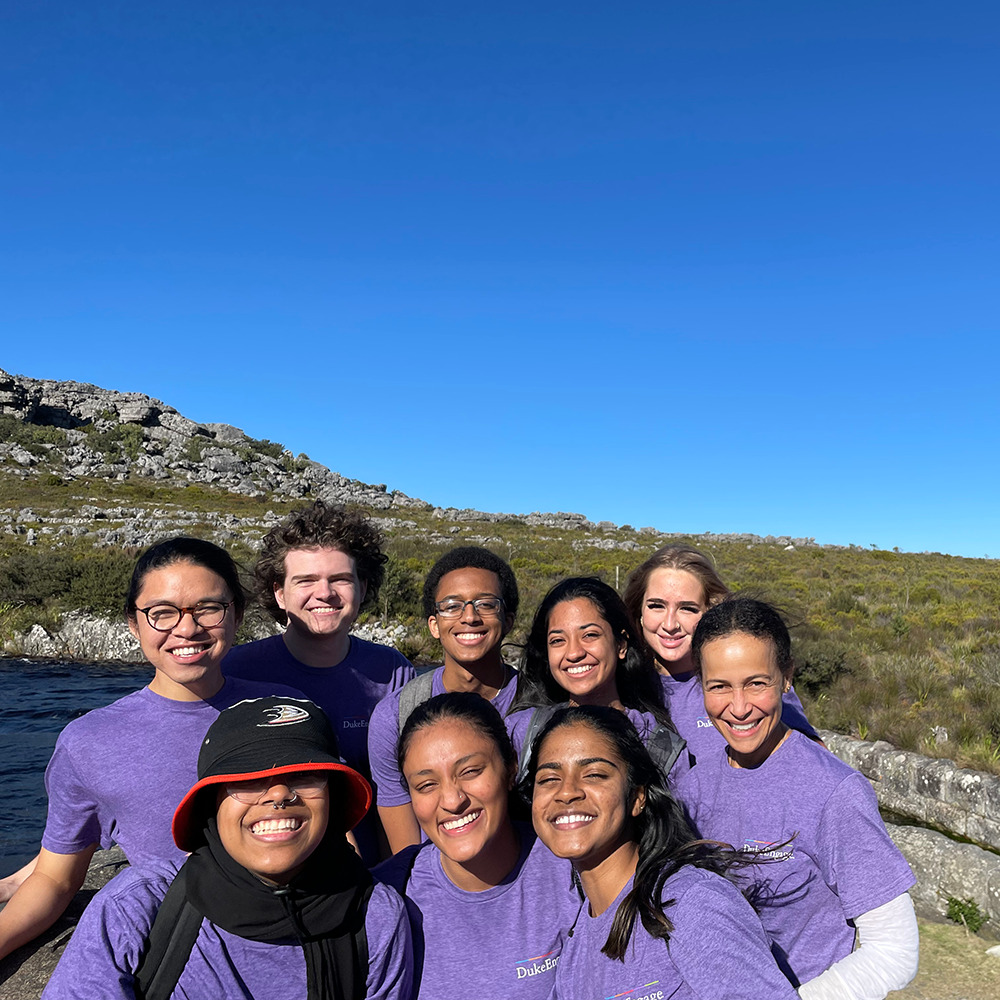

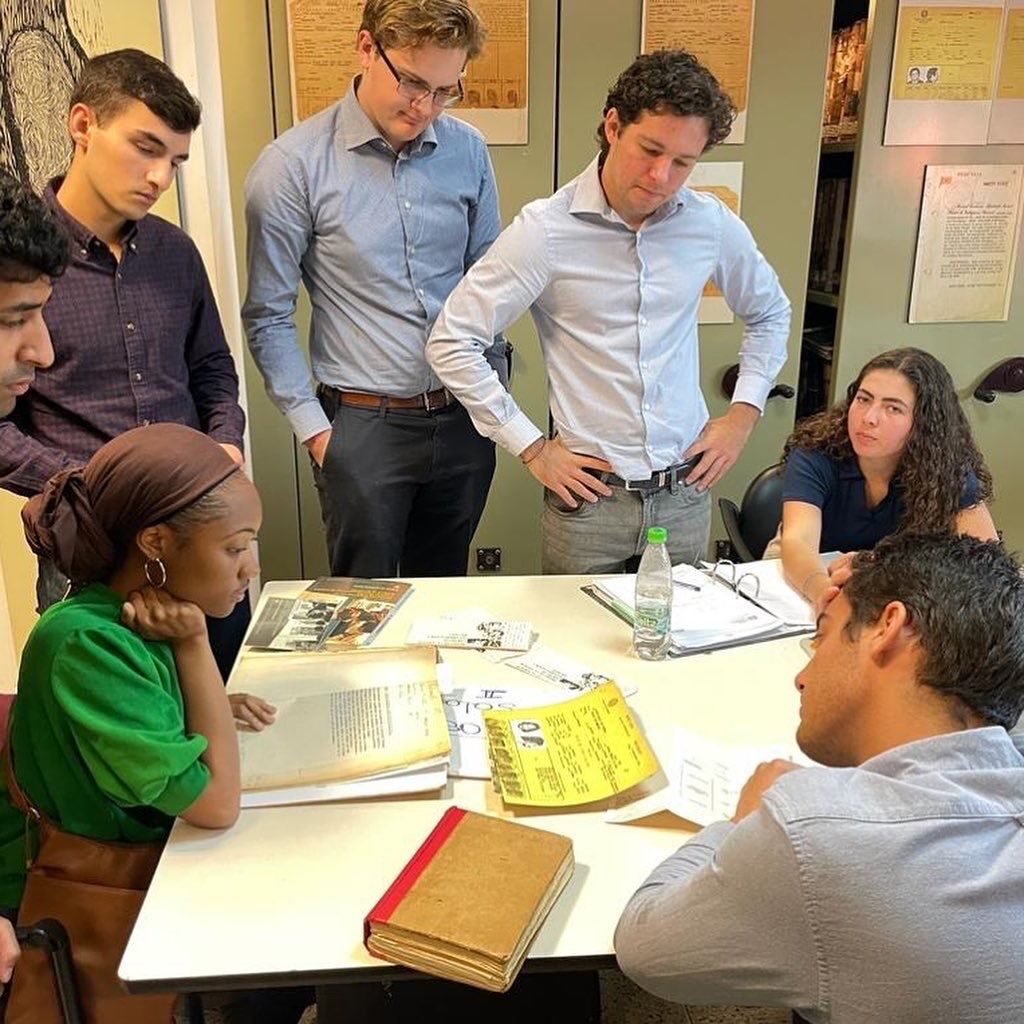
Stories
Accompany DukeEngage students as they connect with community partners across the United States.
Defending Democracy
In our nation’s capital, students pushed past partisan divides to promote truth in media, defend democratic norms and institutions, and protect voting access.
The upcoming Nov. 8 election will be the first general election since the January 6 attack on the Capitol. It is shaped by a rising tide of disinformation and distrust in the country’s foundational democratic institutions. Recent polls show that the majority of Americans—an equal percentage of Democrats and Republicans—fear for the future of democracy.
It was against this backdrop—particularly the number of candidates supporting the former president’s unsubstantiated claims that the 2020 election was illegitimate—that Eric Mlyn launched an eight-week DukeEngage program in Washington, D.C. this past summer, called “Democracy at Risk.”

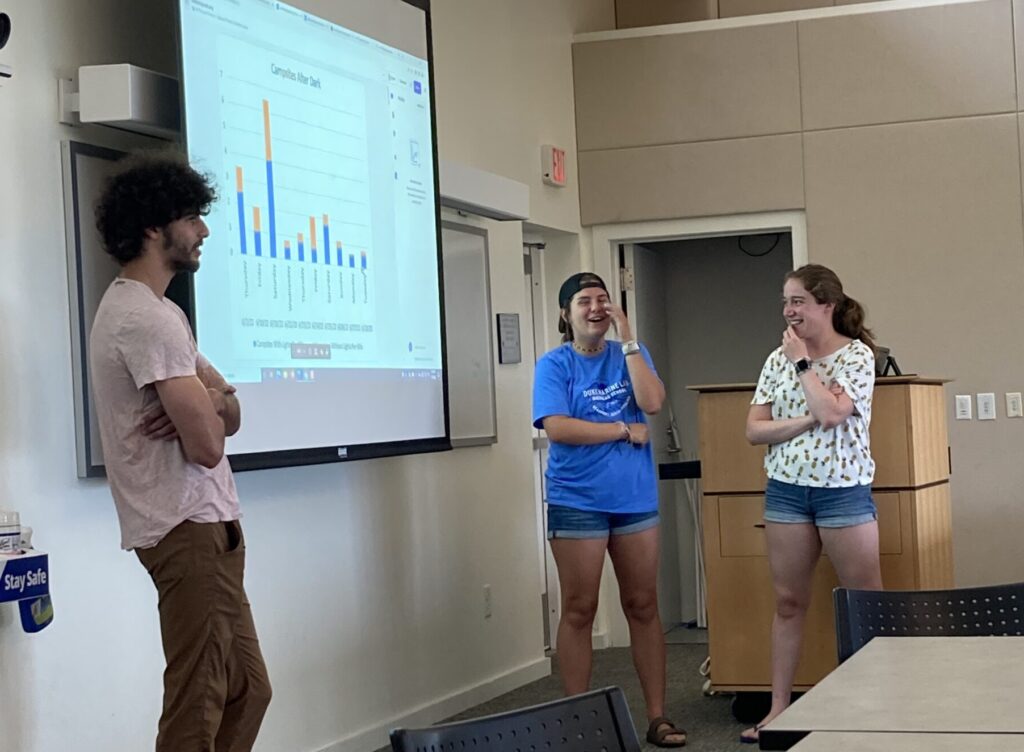
Building Ecological and Social Resiliency
On site with the Duke Marine Lab in Beaufort, NC, students worked on projects that combined environmental science with community engagement.
Conducting research to help protect sea turtles, creating educational materials on water pollution, and designing science-based crafts and activities for children were some of the projects undertaken by students in the DukeEngage Marine Lab program.
“Without DukeEngage’s partnership, we would not have the time, people, or resources to do this important work,” said Matthew Godfrey, a sea turtle biologist with the NC Wildlife resources commission.
Fables of Fortitude
The COVID-19 pandemic was isolating for many people, including kids who lost opportunities for social interaction and development. To address this challenge, DukeEngage Marine Lab students created and presented fables in a workshop for teachers and students at Carteret County Public Schools (CCPS) to help students work through obstacles using a framework developed by the Resiliency Solution. These fables taught lessons about the importance of community connection, intergenerational learning, and flexibility, through fictional stories featuring marine characters, and were later featured on the Seas the Day podcast.

Sharing Chickasaw Culture with Future Generations
A Brodhead Fellow returned to the reservation to reckon with the past and advocate for change through documentary storytelling.
“I was always looking for an opportunity to intern with my own tribal nation and work within my own tribal community,” said Quinn Smith. He found that opportunity through the Brodhead Service Program, which allows students to design their own internship in partnership with a community organization. In this case, Quinn worked with Chickasaw Nation Productions in its multimedia department, as well as its Heritage Series, which produces long-form documentaries about the Nation.

Snapshots
View complex problems through a transcultural lens with DukeEngage students and their partner organizations.
Rethinking Development and Sustainability in Paraguay
In a televised interview with a leading journalist, students weighed in on complex issues faced by Paraguay as it seeks to balance future economic development with sustainability.
This summer, DukeEngage Paraguay students had a unique experience: they were guests on “El Contexto,” an hour-long news program hosted by leading Paraguayan journalists, Luis Bareiro and Estella Ruiz Diaz.
Led by Christine Folch and Luana Lima, the DukeEngage Paraguay program is focused on the Itaipu Hydroelectric Dam, a clean, renewable energy source that produces 90% of Paraguay’s electricity. Students in Paraguay investigated how the country can use its energy surplus to spur economic growth, working with community organizations focused on government, development and sustainability.

Engineering Low-Cost Healthcare Solutions in Uganda
Working with Ugandan engineers and using local resources, students created low-cost medical devices to promote greater access to healthcare.
This summer’s DukeEngage Uganda cohort brought together eight Duke engineers and eight Ugandan engineers from Makerere University with the goal of lowering the barrier to healthcare in low- and middle-income countries.
The approach? Use locally available resources to prototype low cost medical devices.
After conducting needs-finding interviews in local hospitals, each of the four teams narrowed on an idea. Team Orion tackled neonatal jaundice by creating a phototherapy machine. Team Brep aimed to provide more efficient care with an emergency trolley. Team Blue Cranes created a device to monitor the temperatures of up to three babies in an incubator. Team Awesome created an IV bag warmer to decrease the risk of hypothermia in surgery.
Driving Public Health Campaigns in Ghana
Partnering with students from the University of Cape Coast, DukeEngage Ghana students worked to raise awareness among auto mechanics about the harmful effects of discarded used motor oil.
After surveying auto shops to learn more about their practices handling used motor oil, students created an education and awareness campaign to promote safer solutions for mechanics. They performed an hour-long educational story and held a Q&A following the presentation. Students spoke to nearly 300 mechanics during the program.
Infographics for Change
DukeEngage Ghana students and their partners from the University of Cape Coast created this infographic to illustrate safer motor oil handling practices.
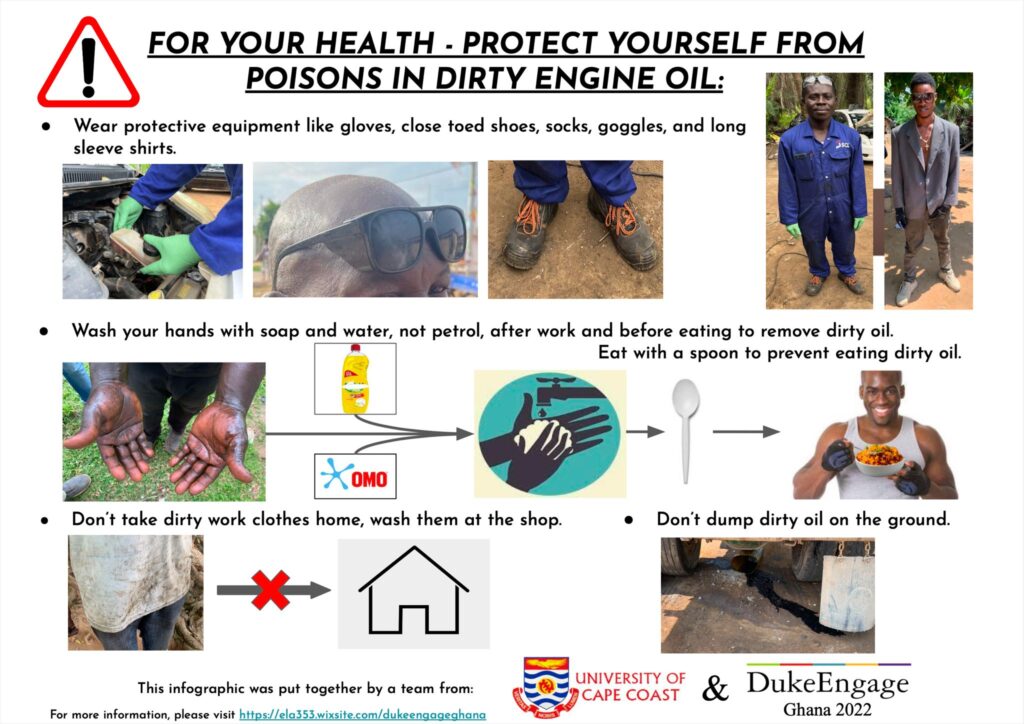
Starting Strong in Service
Through DukeEngage’s Gateway program, incoming Duke students volunteer with organizations in their communities before arriving on campus in the fall.
One of 18 students to complete a service project with Gateway this summer, Victoria Ko worked with the Chinese-American Coalition for Compassionate Care in San Francisco. Her motivation was to encourage dialogue in the Chinese-American community about the “particularly tough subject” of Advanced Care Planning. Through working on projects with CACC, she said she “understood more how people in healthcare navigate resistances” to difficult subjects.

Numbers
Survey select figures that demonstrate the scope and impact of DukeEngage summer group programs.




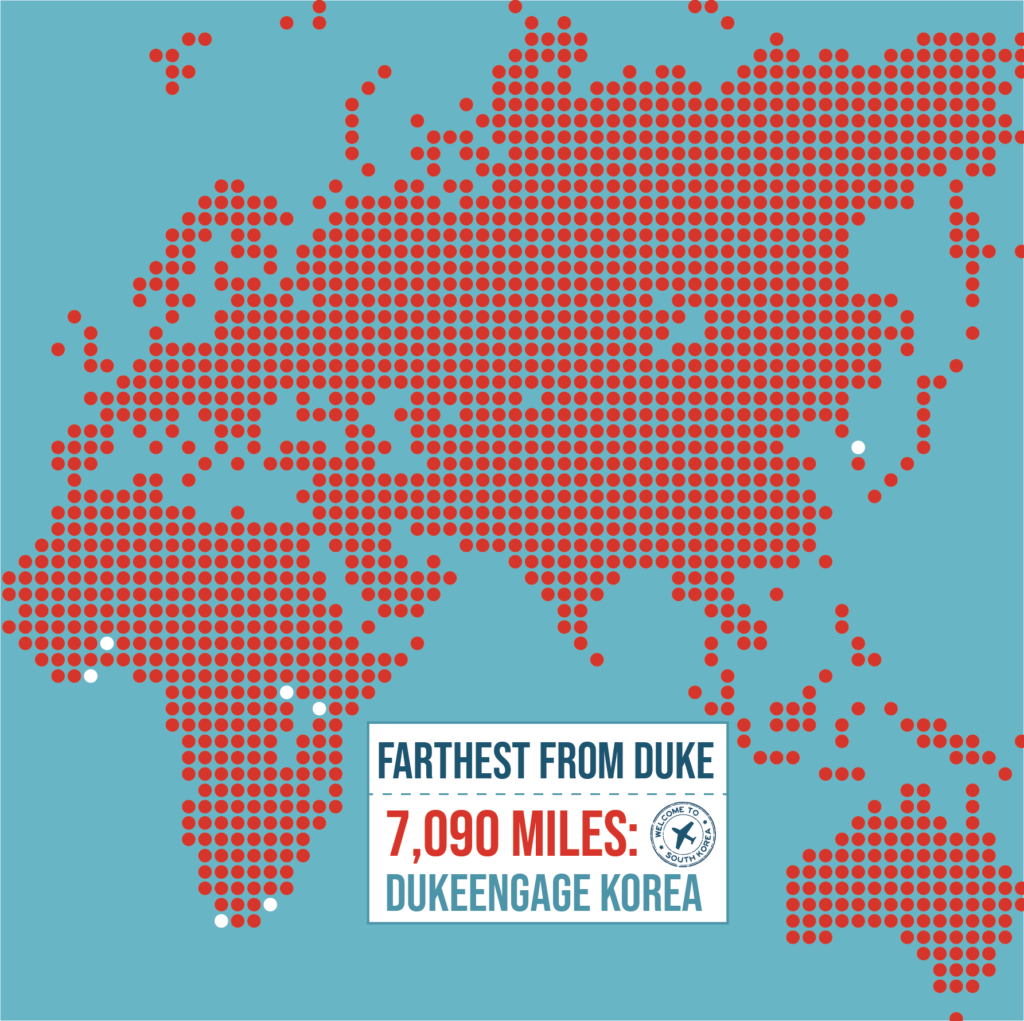
Reflections
Join students, faculty, community partners, and alumni as they reflect on their time with DukeEngage.
“A collective responsibility implies that we all have a stake and part to play in our communal and individual futures. To be responsible for something means being accountable for an aspect of organized social life, and owing others things means finding ways to dig deeper and imagine better futures for each other and for ourselves. I find myself compelled by the idea of collective responsibility and striving to make things better for all of us.”
– Brinda Raghavendra
Student
DukeEngage Cape Town
“From the moment we walked into Catholic Charities Legal Services, CCLS, our lives changed. Through the sorrow, we found hope. We found hope when we translated, and there was relief on their faces. We found hope through the attorneys who found fulfillment in helping these communities of immigrants. But most importantly we learned to see life through a different lens, we began to see life through the eyes of dozens of immigrants we helped at CCLS.”
– Kay Maldonado
Student
DukeEngage Miami
“While it will take a long time to realize DukeEngage Korea’s vision and mission of integrating immigrants into the relatively homogenous country of Korea, I saw that it only requires a short time for personal relationships to meaningfully change and impact an individual child. That is my theory of change. Change can stem from the one-on-one relationships we cultivated and snowball into something of grandeur.”
– Hyonjun Yun
Student
DukeEngage Korea
“The 2022 Duke-WISER partnership goes down in memory as one of the most successful programs: featuring a team with diverse skills, knowledge, and talents. Their willingness and ability to work with the community, gather information through the water survey, participate in community service programs and establish an excellent working relationship with the dominant community transport service providers (piki drivers) were instrumental in the overall success of this year’s program.”
– Kennedy Mikula
Director of Studies
WISER Girls School
Muhuru Bay, Kenya
“DukeEngage allows students to see the tragic but inspiring nuances of making science policy in the U.S. The students come into this program with high hopes about improving the world and making everything better, and I want to take that energy and help them think strategically about their goals. They come into this program with great ambitions, but they leave with the skills and discretion to actually achieve them.”
– Thomas Williams, J.D.
Faculty Director
DukeEngage Washington, D.C.
Science and Society
“DukeEngage continues to be one of the highlights of my Duke experience. It is an absolute pleasure to see so many students have the opportunity to work with renowned faculty leaders, partnering with communities around the world. Programs, such as Duke Engage, remind us that Duke really is a special place.”
– Tre’Ellis Scott, T’15
DukeEngage Board Chair

